Cashew Butter vs Peanut Butter: Which Is Better for You?
Did you know that Americans consume more than 700 million lbs. of peanut butter every year?
If you do the math, this means that the average American consumes over 2 lbs. of peanut butter every year. While nut butter is a household favorite, it also comes with a wide range of health benefits over other spreads.
However, not all kinds of nut butter is made the same. This is why it’s important to take a close look at the different kinds of nut butter and how they stack up against each other. Most importantly: cashew butter vs peanut butter.
Interested in learning more about these two kinds of nut butter? You’ve found the right blog. Here’s everything you need to know about cashew and peanut butter along with the nutritional information of each.
What Is Cashew Butter?
Cashew butter is a creamy food spread made from roasted or baked cashew nuts. This spread is made from just a few ingredients, with high-quality cashew nuts taking center stage. The cashew nuts are first roasted or baked to bring out the flavor. They are then ground up and blended until it becomes smooth enough to spread.
While cashew nuts are not natively grown in the United States, American Dream managed to secure ethical and responsible distribution partners. This means that every tub of cashew nut butter from American Dream is still made to the same high standard.
This direct relationship with cashew farms allows American Dream to produce high-quality nut butter without any added fillers or preservatives.
Nutrition of Cashew Butter
While there are different brands and flavors of cashew butter available, the products from American Dream are all gluten-free, low carb, high in protein, and free of artificial sweeteners. According to the USDA, here’s the nutritional information of standard cashew butter.
Amount: 100 grams
Total fat: 49 grams (75%)
Sodium: 406 milligrams (50%)
Potassium: 546 milligrams (15%)
Carbohydrates: 28 grams (9%)
Protein: 18 grams (36%)
Vitamins and Minerals
Cashew butter is also packed with vital vitamins. Here are the vitamins and minerals you can expect in 100 grams of cashew butter as a percentage of what you’re supposed to have daily.
Vitamin C: 0%
Iron: 27%
Vitamin B6: 15%
Magnesium: 64%
Calcium: 4%
Vitamin D: 0%
Cobalamin: 0%
Health Benefits of Cashew Butter
Cashew butter is a great alternative for people that are allergic to peanuts. In addition to that, it also comes with its own unique benefits. Here are some of the most notable benefits of including cashew butter in your diet.
1. Source of Monounsaturated Fatty Acids
Cashew nuts are incredibly nutritious. These nuts don’t have any omega-3 fatty acids but do contain a wide array of essential amino acids and monounsaturated fatty acids. These acids are great at improving your bone density, blood pressure, and metabolism.
This means that if you’re looking for something low-calorie to boost your overall immune system, cashew butter may be an option for you. Cashews are also naturally filling, making them a great snack to help manage your weight during the day.
2. No Peanuts
While cashew butter is made to have a similar taste and texture to peanut butter, it does not contain any peanuts. This is great for people that may want the benefits of peanut butter in their diets but are allergic to them.
Cashew nuts are still rich in the same vitamins, minerals, and fats as peanut butter. This means that you will be able to get most of the benefits of peanut butter in a safe and healthy way.
What Is Peanut Butter?
As one of the most popular food spreads out there, peanut butter is made from ground, roasted peanuts. The roasting process helps to bring out the flavor of the peanuts before they are ground up and blended to a smooth consistency. Peanut butter can also come in a variety of textures, with chunky peanut butter having small pieces of roasted peanuts mixed into the spread.
American Dream uses natural, dry roasted peanuts to make its peanut butter. This roasting process is handcrafted in small batches to keep the peanut flavor consistent without the need for added preservatives.
The peanuts that are used by American Dream are also sourced directly from farms around the United States. In this way, American Dream is able to make sure every jar of peanut butter is consistent and up to its high standards.
Nutrition of Peanut Butter
While there are different brands and flavors of peanut butter available, the products from American Dream are all gluten-free, low carb, high in protein, and free of artificial sweeteners. According to the USDA, here’s the nutritional information of standard peanut butter.
Amount: 100 grams
Total fat: 50 grams (76%)
Sodium: 17 milligrams (0%)
Potassium: 649 milligrams (18%)
Carbohydrates: 20 grams (6%)
Protein: 25 grams (50%)
Vitamins and Minerals
Peanut butter is also packed with essential vitamins and minerals. Here are the vitamins and minerals in 100 grams of peanut butter as a percentage of what you’re supposed to have daily.
Vitamin C: 0%
Iron: 10%
Vitamin B6: 25%
Magnesium: 38%
Calcium: 4%
Vitamin D: 0%
Cobalamin: 0%
Health Benefits of Peanut Butter
Peanut butter doesn’t just taste good, it’s actually good for your health. Here are some of the major health benefits of including peanut butter in your diet.
1. Heart Health
Peanut butter is high in protein but also in a wide range of vitamins and minerals. These vitamins are known to aid in heart health. One study has even noted that eating peanuts every day can decrease your risk of heart disease by around 38%. If you have a history of heart disease or want to be extra cautious, including peanut butter in your diet is a great option.
The main fat in peanut butter is oleic acid which helps to maintain your cholesterol and blood sugar levels. It’s this management that helps to reduce the risk of heart and vascular disease.
2. Reduced Risk of Diabetes
As mentioned above, peanuts are high in oleic acid. While this acid helps to regulate your cholesterol and blood sugar, it can also help reduce the risk of diabetes. This is due to it reducing your body’s insulin resistance.
If you have diabetes or are prone to diabetes, including natural peanut butter in your diet can help you manage your blood sugar levels. However, you should note that peanut butter is high in sugar. That means that too much of it can be unhealthy.
3. Weight Management
Lastly, peanut butter is great for people wanting to manage their weight. Due to the spread being high in protein and low in fat, including it in your diet can help you lose weight. Peanut butter is high in healthy fats. These include monounsaturated and polyunsaturated fatty acids. These acids are known to lower the risk of obesity when added to a healthy, balanced diet.
The high-protein nature of peanut butter makes it perfect for people wanting to build muscle. With around 25 grams of protein per 100 grams, peanut butter is one of the best sources of protein out there.
Peanut Butter or Cashew Butter: How To Choose
When it comes to choosing a nut butter, both peanut butter and cashew are healthy and nutritious options. Both of these kinds of butter are made in very similar ways, making the decision even more difficult. However, there is a distinct difference in taste and nutrition between the two.
While both kinds of butter are nutritious, peanut butter has significantly more protein per serving. Cashew butter comes with 18 grams of protein per 100 grams while peanut butter has 25 grams of protein. Peanut butter also has much less sodium than cashew butter. This can also be something to look out for.
This is why the decision between cashew butter and peanut butter is dependent on your specific nutritional needs. If you need to reduce the sodium in your diet, switching to peanut butter may be better for you. Peanut butter may also be the better option if you’re looking to add more protein to your daily diet.
Cashew Butter vs Peanut Butter: The Conclusion
While cashew butter is low-calorie, peanut butter comes with way more protein per serving.
This means that the conclusion of the cashew butter vs peanut butter debate is that it’s completely up to you. When it comes to the health benefits, each will be better for different lifestyles. Cashew butter may be better for losing weight, but peanut butter is the choice for those wanting to build muscle.
Whether you’re looking for cashew, peanut, or any other kind of nut butter, be sure to check out American Dream Nut Butter today!
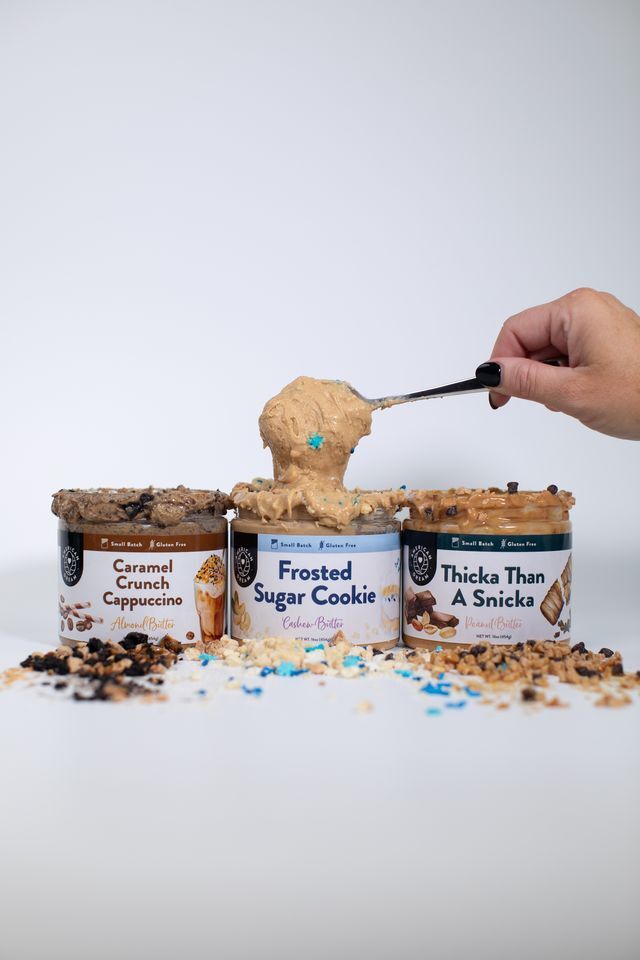 All Nut Butters
All Nut Butters
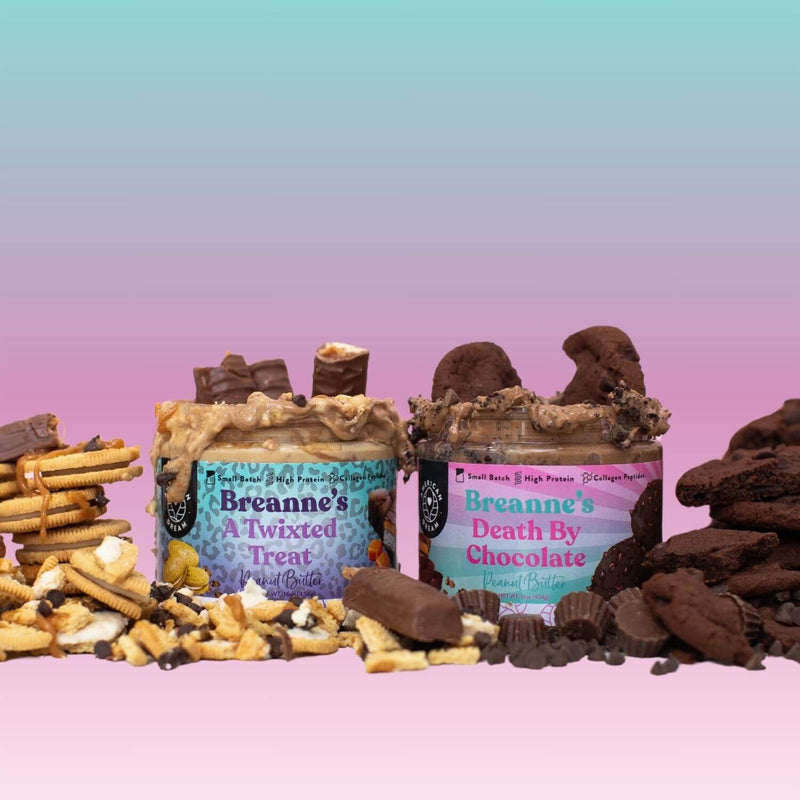 Highest Protein
Highest Protein
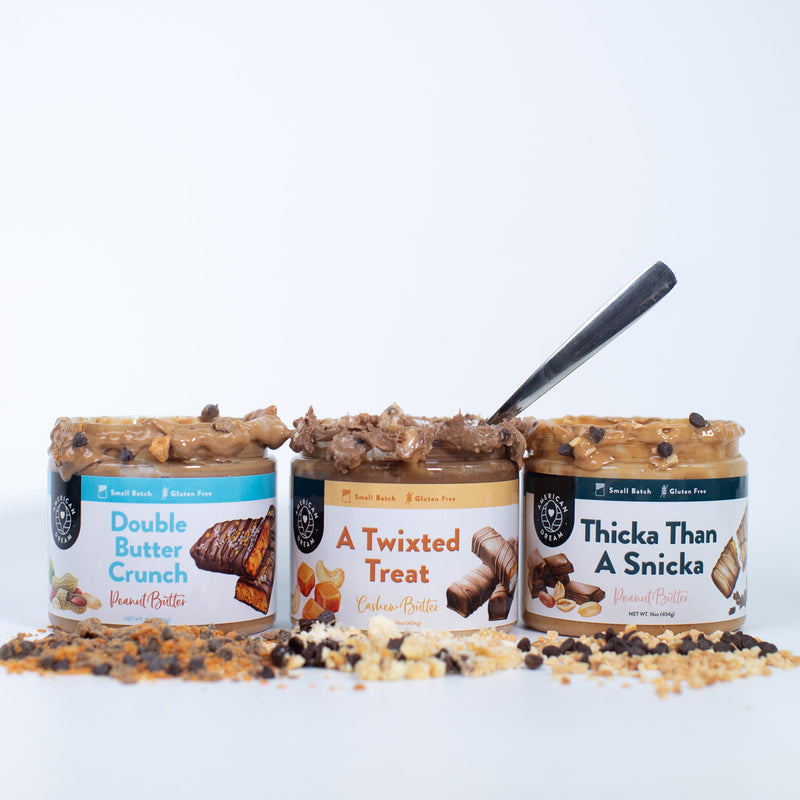 Butter Bundles
Butter Bundles
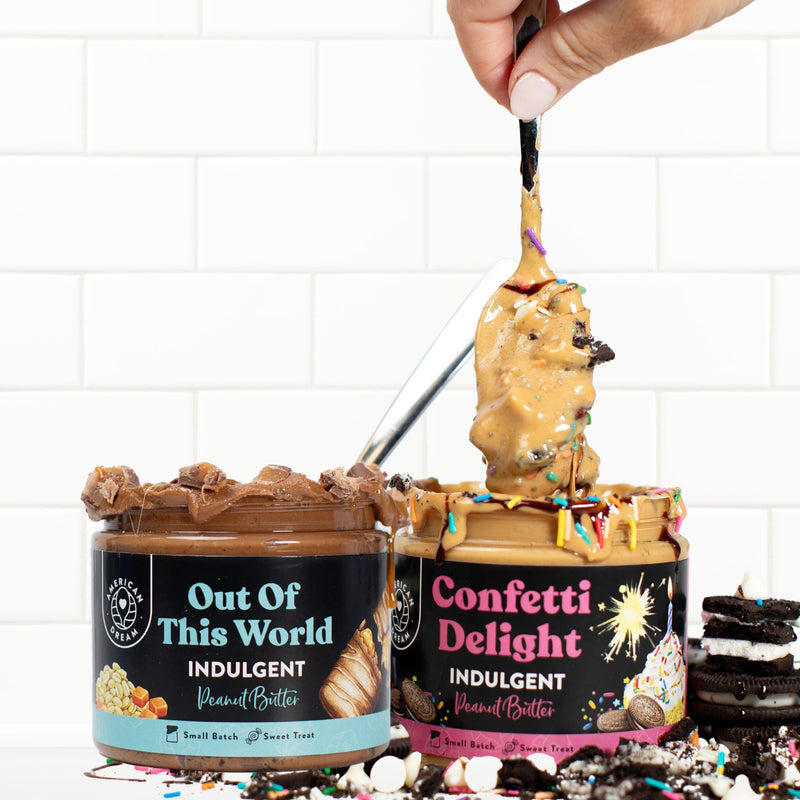 Indulgent Butters
Indulgent Butters
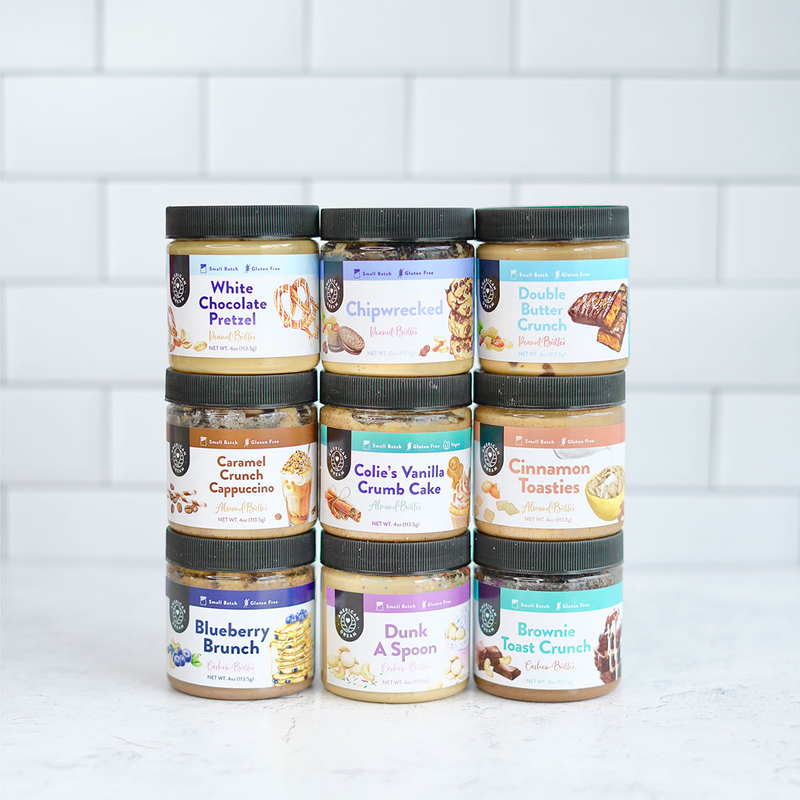 Sample Sizes
Sample Sizes
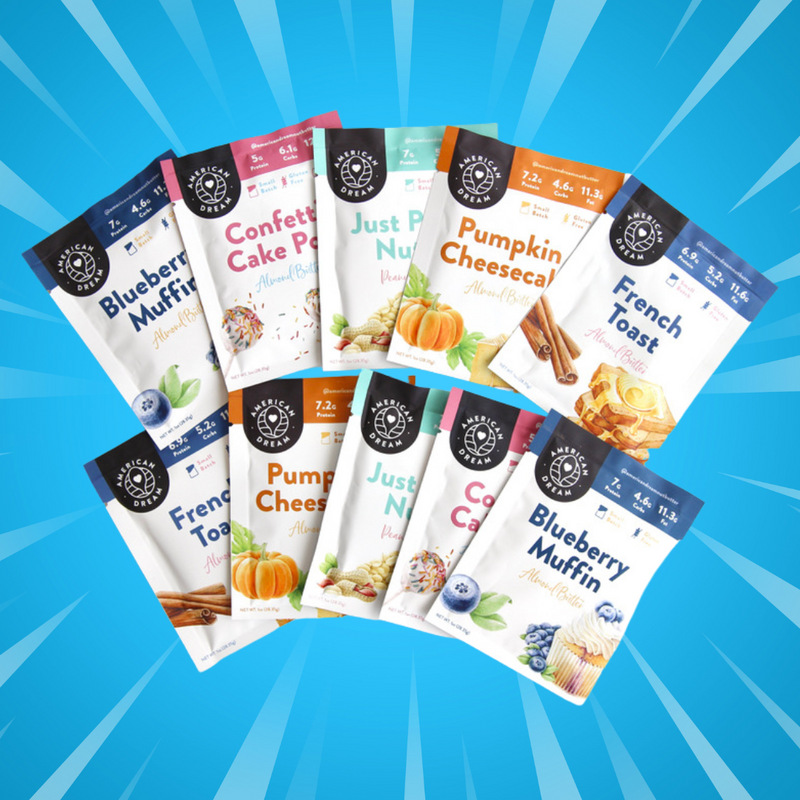 On-The-Go Packs!
On-The-Go Packs!
 Retiring Soon!
Retiring Soon!
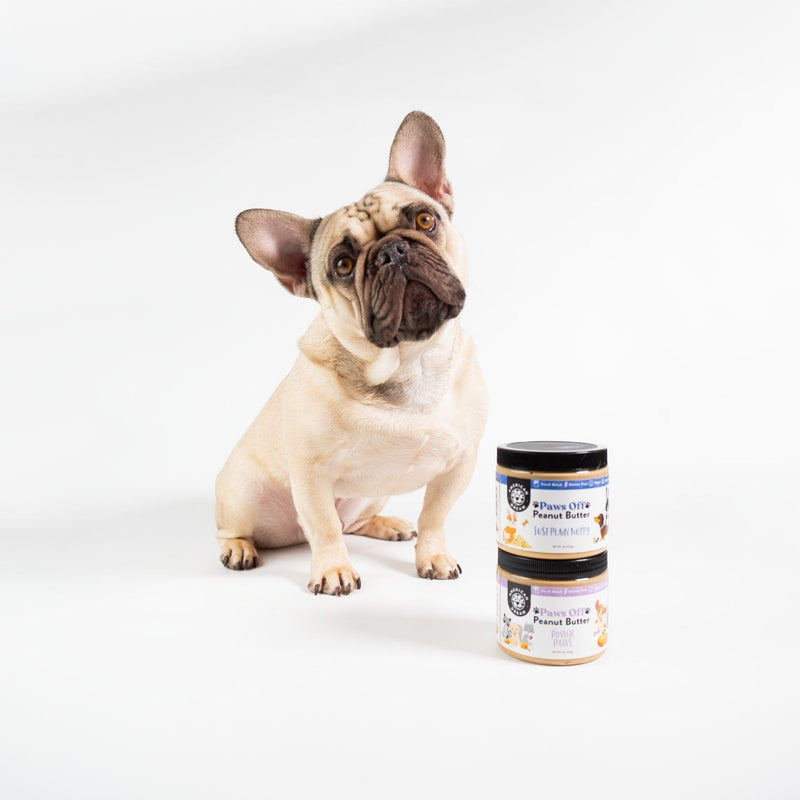 Paws Off
Paws Off
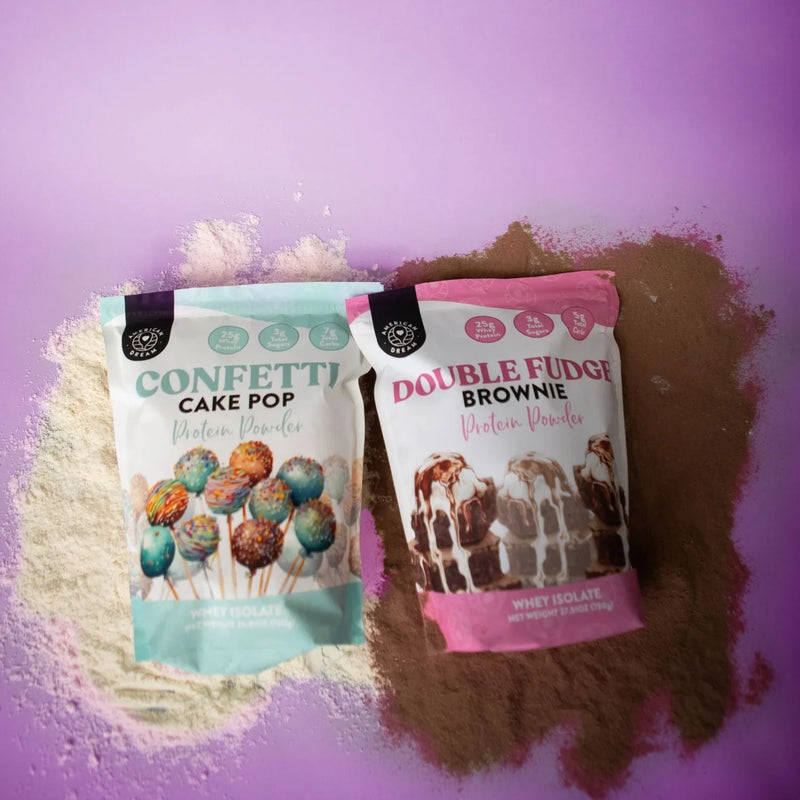 Nutrition
Nutrition
 Merch
Merch
 Gifting
Gifting
 Lucky You
Lucky You

